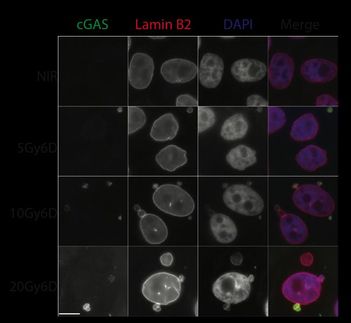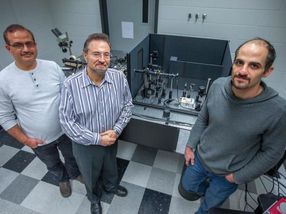Moffitt researchers find potential new therapeutic target for treating non-small cell lung cancer
IKBKE kinase, induced by tobacco carcinogens, may be a target for treating tobacco-associated lung cancer
Researchers at Moffitt cancer Center have found a potential targeted therapy for patients with tobacco-associated non-small cell lung cancer. It is based on the newly identified oncogene IKBKE, which helps regulate immune response. The study appeared in the online issue of Oncogene.
The IKBKE gene is part of a family of enzyme complexes involved in increasing cellular inflammation. IKBKE overexpression has been associated with breast and prostate cancers. However, it had not been linked to environmental carcinogen, such as tobacco smoke, until now.
Tobacco smoke is the strongest documented initiator and promoter of lung cancer. The traditional model holds that tobacco components promote carcinogenesis through a process that leads to DNA damage.
Recent studies have shown that tobacco smoke can also promote lung cancer through changes in the pathways that regulate cell proliferation and survival. This study explored identifying and understanding one of the signaling pathways in order to find potential drug targets to treat non-small cell lung cancer.
In this study, IKBKE was found to be induced by two tobacco carcinogens: nicotine and a nicotine-derived nitrosamine ketone found in tobacco smoke. Their findings suggest that IKBKE is a key molecule related to tobacco-induced lung cancer.
"Since IKBKE kinase is induced by tobacco, small molecular inhibitors of IKBKE could have a therapeutic drug potential for lung cancer," explained lead author Jin Q. Cheng, Ph.D., M.D., senior member of the Molecular Oncology Department at Moffitt.
Current treatments for non-small cell lung cancer include surgery, radiotherapy and chemotherapy. However, patients eventually develop resistance to treatment. There is a great need to better understand the molecular mechanism of resistance and develop new gene-targeted therapies that can circumvent resistance, said the authors.
In this study, the researchers also reported for the first time that IKBKE is a target of STAT3, a transcription factor that plays a key role in many cellular processes, such as cell growth and programmed cell death.
According to the researchers, STAT3 is frequently activated in various types of human cancers and, when activated, STAT3 increases IKBKE overexpression and protein levels. In non-small cell lung cancer, nicotine-induced IKBKE depends on STAT3.
The authors noted that the activation stage of STAT3 represents an attractive therapeutic potential because IKBKE is a STAT3 target. While IKBKE induces chemotherapy resistance, knocking down IKBKE sensitizes cancer cells to chemotherapy and reduces cancer cell survival.
"Since the IKBKE kinase overexpression is induced by tobacco smoke and IKBKE levels increase in response to nicotine and nicotine-derived nitrosamine ketone, this evidence can be potentially used to develop a non-small cell lung cancer intervention strategy that targets IKBKE," concluded Cheng.
Most read news
Other news from the department science

Get the life science industry in your inbox
By submitting this form you agree that LUMITOS AG will send you the newsletter(s) selected above by email. Your data will not be passed on to third parties. Your data will be stored and processed in accordance with our data protection regulations. LUMITOS may contact you by email for the purpose of advertising or market and opinion surveys. You can revoke your consent at any time without giving reasons to LUMITOS AG, Ernst-Augustin-Str. 2, 12489 Berlin, Germany or by e-mail at revoke@lumitos.com with effect for the future. In addition, each email contains a link to unsubscribe from the corresponding newsletter.























































